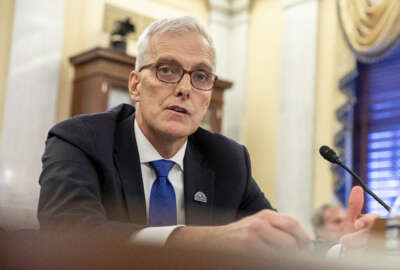

About one in four federal employees are veterans, spouses of veterans, or reservists. The Interagency Veterans Advisory Council, with 125 agencies participating,...
Best listening experience is on Chrome, Firefox or Safari. Subscribe to Federal Drive’s daily audio interviews on Apple Podcasts or PodcastOne.
About one in four federal employees are veterans, spouses of veterans, or reservists. The Interagency Veterans Advisory Council, with 125 agencies participating, tracks veteran federal employee issues. Its most recent annual report had a couple of recommendations. With more on that, the Federal Drive with Tom Temin talked with the the Council Chairman and a Senior Business Opportunity Specialist with the Small Business Administration, Lloyd Calderon.
Interview transcript:
Tom Temin: And just review basically what the interagency veterans Advisory Council does, what it’s all about what its mission is.
Lloyd Calderon: Sure. Our mission is to kind of be the eyes and ears for veterans and military spouses in the federal workplace. And then we take information that we find out there that’s reliable information, and we digest it. And we funnel that up to senior leadership for their actions. There’s plenty of resource groups throughout the federal government; those folks are really the boots on the ground for senior leaders if they’re interested in listening to these groups. And then we become the eyes and ears for senior leaders, and then provide recommendations based on our observations. And I like to say we like to take information, separate facts from fiction — because sometimes people complain just to complain, right? — but sometimes there’s real issues out there that nobody’s addressed. Because it’s like a shotgun effect. People are always talking about it, but nobody’s doing anything about it.
Tom Temin: And what are some of the veteran issues currently now that are unique to veterans in their role as federal employees?
Lloyd Calderon: Well, the biggest one is, first of all, getting into the federal workplace. Now, yes, we have a large workforce. There’s always a turnover. But the biggest is getting people to qualify to enter the federal government, once they leave military service, that’s the biggest challenge,
Tom Temin: Right, because you have a little pushback, sometimes, from hiring managers aware of the veterans preference, but yet, in some cases, they’ll say that that’s a hindrance to getting the people they really want in terms of skills. So you must be working that issue a lot also.
Lloyd Calderon: Right, the veterans hiring preference, you can look at it as a double edged sword, if you will. I mean, it’s a good thing for the veteran if it’s used, right? And then if it’s used correctly, that’s even better. But then there’s a perception that, “oh, geez, veterans get all these benefits. And the only reason they got this federal job is because they’re a veteran.” What people tend to forget is that you still have to meet the minimum requirements to be considered for a position. Even though you may be a veteran, that isn’t the guarantee, it’s not like the golden key, right?
Tom Temin: And you yourself have had a 30 year career, two thirds of which were as an Air Force officer, and now about 9-10 years with SBA. What did you encounter in switching from uniform to veteran status, and then joining the federal workforce? Sounds like it inspired you to take on this extra role.
Lloyd Calderon: If your audience could see me, I’m smiling now, because I do have a story to tell. When I left the Air Force, I said I will never work for the federal government, right? I’m done with the federal government. Well, guess what? After about 10 years of dealing with the private sector by doing my own consulting gigs, I realized that my passion was serving the American people. So I said, Okay, I’m going to go work for the federal government. It took me another 10 years to get a job with the federal government, even though I had a master’s degree, I’m bilingual, retired military; nobody would interview me. I could not get past that process of when you first put your application in. And that’s really more on me, because you’ve got to know how to speak to the federal government. You cannot speak veteran-speak to a federal entity that doesn’t understand your language. So that was my biggest challenge.
Tom Temin: So in other words, if you say, “Hey, listen, I need a job stat.” Probably it’s not something that’s going to relate well.
Lloyd Calderon: That won’t resonate, right, that won’t resonate. So in my case, I had met a director with the federal government. And I just said, Hey, I’d be interested in coming to work for the federal government. Do you have any advice? A year later, I’m with the federal government.
Tom Temin: And you like it?
Lloyd Calderon: I love it. It’s my passion, working for the American public. And understanding that we’re here in continuance of that oath we took when we joined the military to defend the Constitution against all enemies, foreign and domestic, and to serve the American public in the best way we can. Who better? Of course, I’m prejudiced because I’m a veteran, but who better to serve the American public that veterans that are signed up, when they sign on the dotted line, to give their lives in the cause of this country? And now we would like you to come and work for the federal government.
Tom Temin: We’re speaking with Lloyd Calderon. He’s chairman of the Interagency Veterans Advisory Council and a senior business opportunity specialist at the Small Business Administration, when you’re not doing council work. And so every year there’s a pretty massive, almost 100 page report on the status and condition of veterans in the government. And you’ve got a couple of recommendations headed, I believe, to OPM. In the most recent report, which came out on Veterans Day, what issues do you see? And what are you recommending?
Lloyd Calderon: The key is they’re just recommendations. And I like to think that our recommendations will get people to start asking questions. For instance, why is it that the Senior Executive Service doesn’t have good representation of disabled veterans in the corps? Right? It’s a good question to ask, while no one knows the answer. So that’s one challenge: How do you transition somebody into the Senior Executive Service Corps who are disabled veterans? And it’s a good question to ask. So we asked senior leaders to think about those things. And hopefully somebody will say, “that’s a good question. Let’s have a conversation about that.” Another one is, of course, the issue dealing with military spouses, right? Military Spouses are an amazing group of folks who sacrifice for their military spouse, and are not rewarded with some considerations when it comes to federal employment. Yes, there are some hiring authorities to deal with that. But we still have the issue of how do we transition from here to here as seamlessly and as painlessly as possible. So when a spouse has to leave her job or his job to PCS — to do a permanent change of station with their military spouse — we need to do a better job of ensuring that that sacrifice is recognized and accommodations made to make that a much more easier transition.
Tom Temin: All right. And I had another question: If one is a federal employee, and has been there a while and a veteran comes into that agency, what is the best way for an existing person to mentor the veteran such that he or she can get inculcated and get comfortable working in the agency? And that person, the mentor may not be a veteran, but they do know the way around the government. So what’s the best way to interact there so everybody gets something positive out of the relationship?
Lloyd Calderon: Great question. And I think it falls back on these Employee Resource Groups. Get engaged with an employee resource group at your organization, if you have one. If you don’t, then think about starting one. And number two, find a mentor. And we’re actually having an initiative for this year coming up, where we’re creating a mentorship program. Now, there’s mentorship programs already out there. But this will be specifically focused on veterans. Before they enter the federal workplace, we want to engage them with a federal employee who’s agreed to mentor them, so that when they start applying, and start interviewing, they’re not doing so from a flat footed perspective. They’ve got somebody who’s been in federal service that says, “Okay, you got to do your resume this way. And you have to speak like this, you have to answer the questions like that.” So I think that’ll lend itself tremendously to help folks come on board, meet the requirements, and then be able to sell themselves effectively. I used to be a recruiter, and we were always about selling, right? And we don’t want to sell the steak. But let’s sell the sizzle. So when when I want to come on board, I have a lot of skills, and I have hard skills and soft skills, and ought to be able to communicate that effectively to whoever’s interviewing me. So I think the biggest thing is let’s find mentors, bring them on board, connect them with veterans, as well as those that are thinking about coming to the federal workplace and help them connect those dots that they’re not connecting.
Copyright © 2025 Federal News Network. All rights reserved. This website is not intended for users located within the European Economic Area.
Tom Temin is host of the Federal Drive and has been providing insight on federal technology and management issues for more than 30 years.
Follow @tteminWFED


